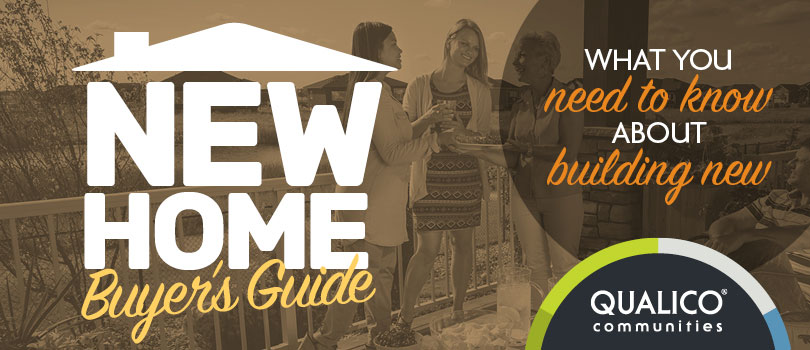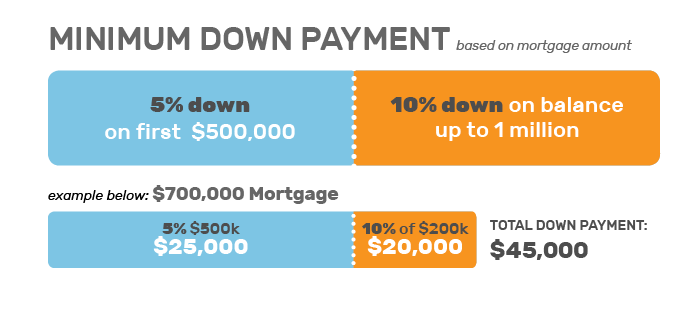New Home Buyer's Guide - What you need to know about building new!
Mar 31, 2017

Caring about the people in our communities is at the heart of what we do at Qualico Communities. This shows through in the well appointed, welcoming communities we provide with all the amenities to satisfy the diverse lifestyles of Winnipeg homeowners. It’s also in helping those looking to settle in one our communities become as knowledgeable as possible about the choices available in building a new home. We know this can be an overwhelming process—but it doesn’t have to be.
This is the first of a series of blogs to help break down the steps of building a new home so that you can start to see yourself in a home in one of our inviting communities. The series will cover tips for choosing your community, selecting the builder, designing your home, and finally, how to stay sane during the build.
So, you’re thinking about building a new home
Maybe you’ve been looking at the existing home market and haven’t found what you want or you’re nervous about buying a house with “pre-existing conditions”. The idea of building a new home has started to feel like the right one for you. It’s possible this is your first home or you’re moving up into something bigger for a growing family. Maybe you’re even downsizing to adapt to your changing lifestyle. There are so many choices.
Our advice? Take your time. Many new homebuyers feel pressured to move quickly, but the fact is the decision to take the next steps to build can take anywhere from six months to three years. In the vast majority of cases, it’s worth the wait and it’s just as important to get started on the right foot.
Understand who does what
Qualico Communities isn’t a home builder.
We’re a reliable, experienced land developer with a reputation for both beauty and sustainability in our developments. Our focus is on well-designed communities that balance attributes of both rural and urban living. This means features like natural wetlands, hiking trails, and sustainable green spaces with proximity to all the conveniences homeowners expect in developed neighbourhoods. We pay attention to these details, so you can stay focused on the decisions of choosing the community and builder, lot, style of home and financing options that are best suited to your lifestyle.
We leave the building to the builders.
That’s who you’ll deal with to purchase a lot and the premium or customized home you plan to build. Choosing the right builder is a key decision since you’ll have to “live” with them from the start to finish of your build. We partner with many of Manitoba’s top home builders, who follow strict guidelines Qualico has set for our communities. The Choosing a Builder blog (coming soon!) will help you in understanding the choices available. In the meantime, tour some of the home builders’ sites, check out a few show homes (open year-round) and start to think about the style and design features that feel like “home” to you.
A custom home gives you design flexibility and freedom to choose exactly what you’d like in your home. Although you may want to start by looking at existing plans to determine your preferences, your home can be completely tailor-built for you. All Qualico Communities offer the option to build a custom home, while Qualico’s Oak Bluff West and Taylor Farm communities are custom home only developments.
A premium home allows you to still be involved in design choices but streamlines the process by providing pre-selected options. The builder may make recommendations based on your preferences for your home and lifestyle as well as your lot configuration. Plans can often be modified to allow for some customization but this may incur additional costs. Sage Creek, River Park South and RidgeWood West are Qualico Communities that offer both premium and custom building options.
Visiting a show home is a great way to talk to a representative to ask any questions you may have. You’ll also get a better look at their floor plans to better understand the builders style and design features to see how they may be able to fulfill what you are looking for in your home. You’ll work with the builder to determine the total cost you’ll be financing for your new home.
Figure out your financing
It can save a lot of heartache if you start with your banker, credit union or other financial institution to get pre-approved or pre-qualified and to determine your home buying budget before you go any further.
Down payment
Most people will need to consider a mortgage when purchasing a new home. If you have less than a 20% down payment you will require mortgage insurance from the Canada Mortgage and Housing Corporation (CMHC)
With CHMC Mortgage Insurance, you will require minimum 5% down payment of the total mortgage amount for a home under $500,000. For a mortgage from $500,000 to $1million, you will require a larger down payment of 10% on the amount above $500,000. Homes valued over $1 million can not be insured by CHMC and will require a minimum 20% down payment to your lender.

Example: a $700,000 mortgage requires a minimum down payment of $45,000 – 5% of the first 500,000 ($25,000) + 10% of remaining 200,000 ($20,000).
Determining the down payment you are able to manage helps to shed light on the total cost of the home you can afford.
RRSP borrowing
If you’re a first time homebuyer, under the national Home Buyer's Plan, you are able to use your RRSPs as part of your down payment or closing costs. Up to $25,000 ($50,000 for couples) tax-free can be borrowed from RRSPs without penalty as long as it’s repaid within 15 years. You don’t have to begin repayment for the first two years.
Closing costs
In thinking about how much you’ll put down, be aware that there can be many unanticipated costs that you’ll need to consider before you move into your home. This can include “closing costs” for things such as mortgage default insurance, indirect broker fees, title insurance, land transfer taxes, lawyer fees, appraisals, home insurance and more. You can consider including some of the closing costs into your mortgage allowing you to amortization them over the term of your mortgage.
 Pre-approval
Pre-approval
Having your finances in place before you start the process of looking at building plans, builders or communities puts you in a better position to discuss with the builder and to begin without unnecessary delays.
Pre-approval is easy to arrange and a cost-free, win-win for the new homebuyer. It usually ensures that you have a guaranteed interest rate for a set period of time, which can be 90 days or longer if you need. If interest rates go down during that time you get the lower rate. If they go up, you still get your locked in rate that was guaranteed with your pre-approval.
How much debt can you carry?
The CMHC indicates that monthly housing costs shouldn't be more than 32% of your gross monthly income. CMHC has a Mortgage Affordability Calculator to help you estimate the mortgage you can afford. Your lender will also help determine the size of loan and the type of mortgage that can be considered, depending on interest rates and amortization periods (length of your mortgage) and the type of mortgage best suited to your needs. This can include open, closed, fixed rate and variable/adjustable rate mortgages as well as home equity lines of credit.
How much debt should you carry?
Just because your lender says you can carry a larger mortgage, doesn't mean you should. Consider your lifestyle and preferences such as if you’ll be wanting luxury furnishings and accessories in your new home, perhaps you also like to travel, see a vacation home in your future, or will be paying for education or other expenses for your family.
These important financing decisions will help guide you in the selection of lot and size of the home, whether you will go premium or custom, the finishes and upgrades you’ll be able to afford, and more.
Now that you’re set to prepare to build your new home, watch for our next post on choosing your place in one of our Qualico Communities.
A few more tips for preparing for the build
Do the research.
Online websites such as the CMHC, banks, credit unions and mortgage brokers have tons of information on mortgages and other financing options.
Line up your lawyer.
If you’re buying a home, you’re going to need a lawyer (or notary) to search the title, draw up mortgage documents, register new ownership and liens, look after other closing details including the disbursement of funds on dates specified in the mortgage agreement, and review the contract between you and the builder. This should happen before you sign anything. As you should do at every step of the home buying/building process, document everything that your lawyer agrees to do and keep track of charges that are levied for services.